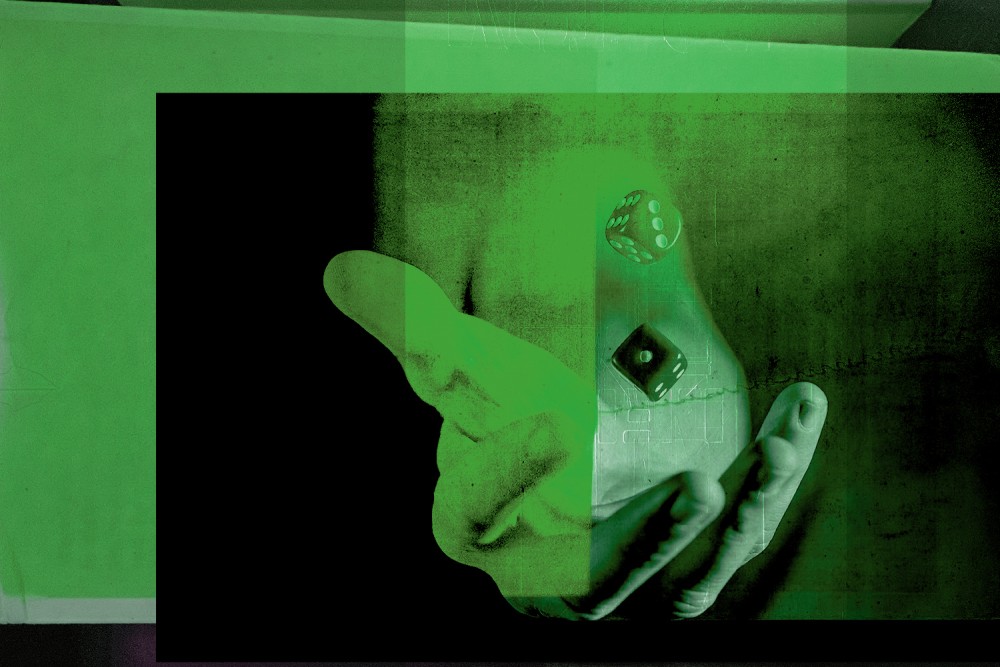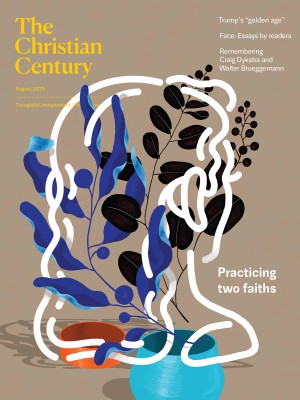The case for being a killjoy
We may be reluctant to say anything that sounds puritanical. But our private morality really does matter.

Century illustration (Source image: Getty)
Some years ago, in my prior life as an underpaid and ineffective professional do-gooder, I found myself at an event featuring speeches by local left-leaning faith leaders. This was around 2005. The issues then confronting a sensitive young conscience included the Iraq War, torture, global warming, misogyny, racism. And so I was bemused when the speakers spent a good bit of the morning inveighing against . . . gambling.
Was it 1919? Were we going to mount a campaign against dancing next? Had I escaped fundamentalism, with its constant little skirmishes against harmless or healthy interests (heavy metal, natural history), only to find myself among another group of fun-phobic puritans? I have never forgotten the way one speaker pronounced the words “Texas hold’em,” her voice quavering with indignation, sounding for all the world like one of the youth pastors of my childhood spitting and drawling their way through names like Twisted Sister or Beavis and Butt-Head.
Read our latest issue or browse back issues.
I am now retrospectively bemused by my own bemusement. In many states (including mine), online sports gambling has become legal and ubiquitous. The results have been horrible: higher household debt, declining credit scores, and increased self-reporting of gambling addiction, not to mention those weirdly misanthropic BetMGM commercials. It is beginning to look like a public health crisis.
Now, I wouldn’t want to see gambling fully prohibited, both because that would require too much interference in people’s daily lives and because I don’t want to get between my mother-in-law and her favorite hobby. The government should interpose itself between an artist and her medium as rarely as possible, and that woman is an artist with slot machines. She has been kicked out of more casinos than anyone I’ve ever met. And anyway, Native monopolies on gambling in some areas are the closest thing the United States is presently willing to grant in lieu of much-needed Indian reparations.
But we need to think about how large a place we are willing to grant this habit in mainstream American life. Those scolding ministers were onto something.
Realizing they were right has me thinking about other cases of American moral panic that seemed puritanical but turned out to have a point. Like most people, I was taught to think of Prohibition as an obvious policy failure, a regrettable incident that invited mass hypocrisy and empowered organized crime. It certainly was this, but social historians now stress as well that the temperance movement was responding to a genuine problem: 19th-century Americans really were drinking like crazy, and it fueled a lot of domestic abuse. I’m glad not to live under Prohibition. But I’m also glad that American drinking has never returned to pre-Prohibition levels.
Gambling now, and drinking then, seem like the exact kinds of issues—matters of private morality that can be harmless but are risky if unchecked—that the churches ought to be a little annoying about. The world seems to almost expect it of us; it is one of our natural functions. Americans don’t like being scolded, and we hate being silently disapproved of. But such reactions can be a phase in the process by which people start to apply the moral and medical knowledge they already have. (People hated being told not to smoke, and then, by the hundreds of thousands, they quit.)
One reason Christians might resist overt moralizing about certain issues is that we rightly worry about indulging in spiritual pride, the worst of all vices. When pride mixes with class or racial caste systems or sexism, it becomes outright deadly. From Tertullian scolding women for wearing makeup all the way to White Christian conservative pundits expressing their “concerns” about Black unwed mothers (if you’re so concerned, why not send them your money?), it’s a long and ugly litany.
But though it’s hard to avoid those people’s example in practice, it’s easy enough to name what they did wrong: they thought too much of themselves and were insufficiently curious about the other. Christianity also has spiritual resources, from confession to examen, that exist to help us begin our moralizing with the beam in our own eye, and a belief that other people are image-bearers of God is a good spur to curiosity.
We Christians who are politically somewhere left of liberal may also be influenced by the idea that we should look to remake structures, rather than worrying over our individual habits. Frankly, I think that this idea, especially in its most simplistic online form, has become outright pernicious precisely because it sounds so much like wisdom. Obviously, all our biggest social problems have an important structural component. But who makes structures—or changes them or unmakes them? Groups of people. And sometimes it is by working on ourselves that we make ourselves ready to join in those efforts. If all I really feel capable of is playing video games, I am not ready to help in any broader struggle, even if my political opinions are impeccable.
We might—if we wanted to be truly annoying—even say that a left that discourages individual self-improvement is insufficiently dialectical: it assumes that the relationship between the individual and the collective is an already settled thing and thus that actions fit simply under one of these two headings, when in fact they are both processes in which nothing exactly is what it looks like. In saying this, though, I’m speaking a bit of a foreign language. I admire Marx, but I’m not a Marxist. I would like to think that I’m a Christian, but like most people who claim that label, I’m probably doing so prematurely.
I wonder what other issues might fall into this specific space for mainliners. Candidates arguably might include watching American football, eating meat, driving too fast, spending too much time on our phones, and using pornography, at least if it’s violent or mean-spirited (as much of it is). We should be a little more willing to sound schoolmarmish, killjoyish, and puritanical. The Puritans have gotten a slightly worse rap than they deserve, and schoolmarms were often brave and resourceful people. Some joys need killing.






